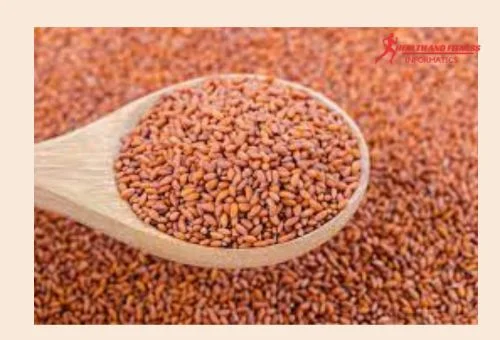6 Amazing Health Benefits of Halim Seeds that Google will not tell you
Overview
Halim
seeds, commonly known as garden cress seeds, originate from the Lepidium
sativum plant. This herbaceous plant, belonging to the mustard family, is
native to Egypt and Southwest Asia and is cultivated across different regions
globally1,2.
These seeds, typically small and reddish-brown, find extensive use in both
cooking practices and traditional medicine worldwide.
Continue
reading and stay connected with us as we delve into the health benefits of
these incredible seeds in this article, including their nutritional, medicinal,
anticancer, bronchoprotective activities, and much more.
What are halim seeds and where are they found?
Garden
cress seeds, scientifically known as Lepidium sativum, are an edible herb grown
primarily for its seeds. They are commonly referred to as garden pepper grass,
pepper cress, or poor man's pepper in different regions. The plant is
cultivated extensively in Asia and is utilized both as a culinary vegetable and
traditional medicine1.
Editor's pick
Psyllium Husk powder how to use, side effects
1. Nutritional and medicinal properties of halim seeds
Halim
seeds hold an excess of ethno-pharmacological properties, making them a
valuable ingredient in traditional medicine.
They
are helpful for their therapeutic effects in treating:
- Bronchitis
- Asthma
- Cough
- Various other ailments
Additionally,
these seeds have anti-inflammatory, bronchodilatory, and anti-cancer potential.
2. Anti-cancer properties
Halim
seeds have cytotoxic effects on human breast cancer cells. The presence of
isothiocyanates, principally benzyl isothiocyanate, has the ability to inhibit
the growth of breast cancer cells.
Research conducted by SH Mahassni and RM Al-Reemi (2013) investigated the cytotoxic effects of garden cress seed extract on human breast cancer cells. Their study focused on the MCF-7 cell line, known for its estrogen and progesterone receptor positivity. Results revealed a significant decrease in cancer cell viability upon treatment with Halim seed extract. The presence of benzyl isothiocyanate, confirmed by high-performance liquid chromatography (HPLC), is believed to contribute to its anti-cancer properties. This study provides compelling evidence of the ability of garden cress seed (Halim seeds) extract to inhibit the growth of breast cancer cells.
Editor's picks
8 Natural mood Stabilizers Balance your life
14 Prebiotic foods to improve gut health
3. Bronchoprotective activity
Halim
seeds improve pulmonary functions and reduce the severity of asthmatic attacks
in patients with bronchial asthma. The administration of finely powdered dried
seeds led to significant improvements in clinical symptoms, help in managing
respiratory conditions .
AN
Paranjape et al. (2006) evaluated the efficacy of garden cress seeds in
patients with mild to moderate bronchial asthma. Patients received finely
powdered dried seeds for four weeks, leading to statistically significant
improvements in pulmonary function parameters and clinical symptoms. This study
suggests the potential usefulness of garden cress seeds in managing bronchial
asthma.
4. Galactagogue potential
The
galactagogue properties of Halim seeds in adult female virgin rats revealed
significant mammotrophic and lactogenic effects, suggesting their usefulness in
lactation stimulation.
MA
Al-Yawer et al. investigated the galactagogue properties of garden cress seeds
in adult female virgin rats. The study revealed significant mammotrophic and
lactogenic effects, suggesting their usefulness in lactation induction.
5.Neurobehavioral effects
Total alkaloids extracted from garden cress
seeds have shown sedative, anxiolytic, myorelaxant, and analgesic activities in
animal studies, highlighting their potential in neurological disorders1.
A. Shukla et al. (2011) investigated the neurobehavioral effects of whole alkaloids extracted from garden cress seeds in animal models. Their study revealed anxiolytic, myorelaxant, sedative, and analgesic activities associated with Halim seed alkaloids.
6. Physicochemical properties and nutritional composition
Cold
press, solvent, and supercritical CO2 extraction methods are employed to
extract garden cress seed oil (GCO). Rich in α-linolenic acid and other fatty
acids, GCO exhibits stability and offers various health benefits. It contains
tocopherols and carotenoids, contributing to its antioxidant properties.
Conclusion
Halim seeds, derived from the garden cress plant, offer numerous health benefits owing to their rich nutritional profile and medicinal properties. From anti-cancer and anti-inflammatory effects to bronchoprotective and galactagogue potential, these seeds hold promising therapeutic value and deserve further exploration in medical research.





.jpg)
Post a Comment